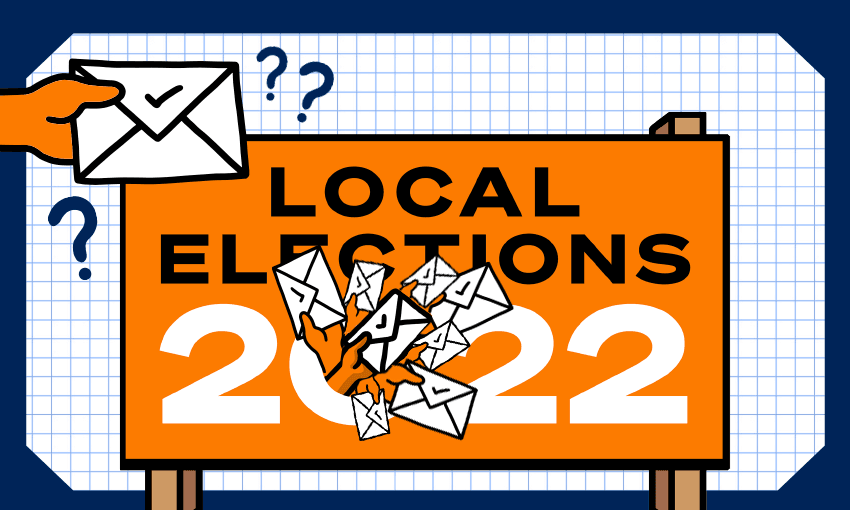Spoiler: don’t open them and vote.
Local election fever is here. Or it might just be a head cold. Either way, a number of readers have got in touch since the distribution of voting papers began at the end of last week to say that between one and a whole heap of voting papers encased in paper envelopes have arrived at their home, addressed to some unknown human, presumably a former resident of the place.
What to do?
Should I open the envelope and vote for a second, third, whatever time, thereby being even more democratic than the average person?
Don’t do that. Electoral law guru Andrew Geddis, of Otago University, says, with a link to one of the pieces of legislation he has permanently open in a tab, if not tattooed on his midriff: “Do you really want to risk going to jail for up to 2 years?”
And there’s a point of principle here, too; having more than one go at voting is hardly democratic. Vote early is fine, encouraged even. Vote often, not so much.
Unless you’re a property owner?
OK, sure – that’s a tricky one.
I don’t want to go to prison, but I don’t think anyone would know, and my opinions are excellent. Can’t I just …?
Prof Geddis again: “People might think, ‘I’ll cast several votes, and who will ever know? It’s a secret ballot!’ Well … surprise! It isn’t.”
He explains: “Every voting paper has on it a barcode that links that particular voting paper to the name of the voter it was issued to. This then allows the election officials to see who has actually cast a vote. So, if you use someone else’s voting papers, and they then apply for and cast a special vote, the election officials will see that two votes apparently have been cast by the same voter. At which point, they will get in touch with the voter and ask ‘what gives?’ And when the voter explains that they moved and didn’t update their details, so that they only cast one vote themselves, you very well may get a knock on the door from a police officer enquiring as to what happened to the voting papers delivered to your address.”
OK, so what do I do with the extra envelopes?
After nominations close, the Electoral Commission doesn’t have a formal role in the local elections (for more on that, read this). But we asked them anyway. A spokesperson patiently explained: “Voting papers are prepared and sent by councils – this isn’t our mail, so you might want to talk to one of the council electoral officers for their advice. However, our standard advice is that if people receive electoral mail that is not for them, they should send it back marked return to sender. That’s the advice we give when we send out enrolment update packs.”
Good advice; thanks, androgynous anthropomorphic orange goo.
So what do the electoral officers say?
Great question. There are two companies that run almost all the local elections across the country, and we asked them both.
Dale Ofsoske, electoral officer for Election Services, said of the envelopes addressed to people who aren’t you or your housemates: “These should be marked ‘Return to Sender – no longer at this address’ and put back in the post to us. This information is then collated and sent to the Electoral Commission to update their database.”
Warwick Lampp, chief returning officer for Electionz.com, however, said this: “It is an offence for anyone to open and action someone else’s voting documents, so they should just be destroyed.”
So: return to sender or return to dust. Either way, the critical thing is: don’t open them and fill them out, because (a) it’s not right, and (b) you could go to jail.
I think my voting papers may be stuck in someone else’s letterbox. What do I do?
Fret not. You can still vote. First, update your details on the electoral roll (or enrol for the first time) by going here.
You will need to cast a special vote this time around. Check your council website for information on where to do that. If you’re in Christchurch, go here; Wellington here; and Auckland here. Crack on, though. Voting is open now and closes at high noon, October 8. If you’re posting your voting papers back, you’ll need to get them in the post box no later than October 4.
How do you post things?
Another good question. Post boxes, which used to stand, chests puffed across the land, linking the nation in wholesome epistolary bliss, are few and far between nowadays. You can head to your local NZ Post Shop (find your nearest here), while DX Mail post boxes can be found here.
My voting papers haven’t arrived. What do I do?
Special vote, as above. For more on this and other practical “how does this voting malarkey work” questions, read Shanti Mathias’s explainer.


